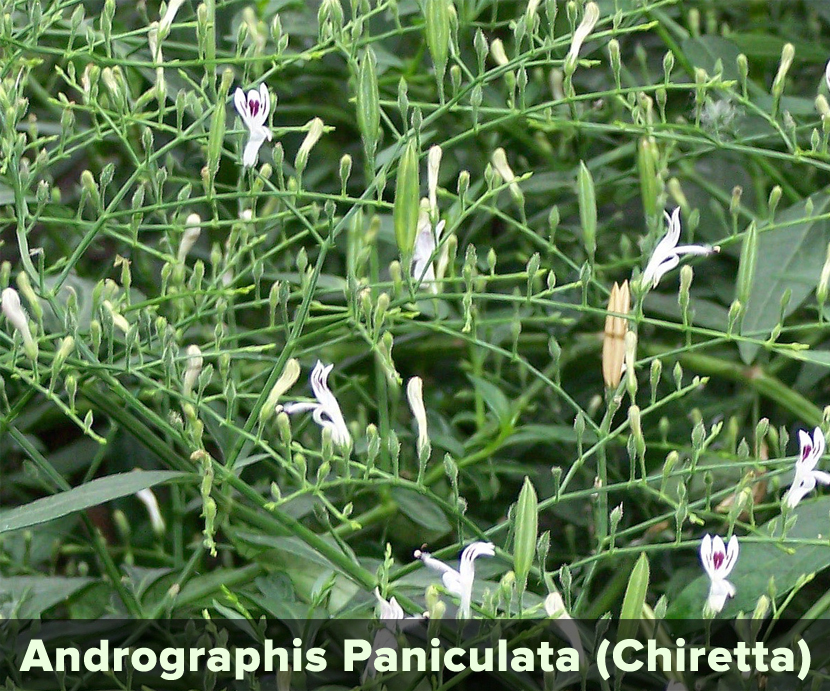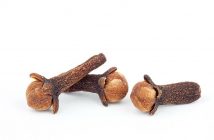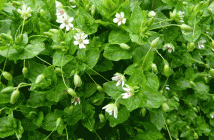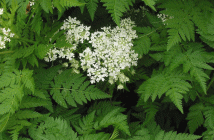 It is an annual herb that can grow from 30-100 cm tall. The steams are distinctly 4-angular and smooth apart from a few hairs those nodes. The Leaves are opposite, simple and narrowly egg-shaped to lance-shaped that size 5-10 cm x 1.2-2.5 cm. The apex is acuminate while the margin is entire and hairless but often gland-dotted. The petiole is short, up to 6 mm long and it is connected to the opposite one by transverse ridges. Flowers are in lax, axillary and terminal racemes or panicles combined into a pyramidal inflorescence, with 2 small bracteoles at base of the 1-7 mm long edicel. The flowers are bisexual and zygomorphic. The sepal has 5 segments, joined at the base, with glandular and aglandular hairs. The petal is bilabiate, white or rose with purple markings on the upper lip. The petal tube is between 5-6 mm long, slightly enlarged below the limb. The lower lip is 4-6 mm long. Oblong and it is 2-toothed at the apex while the upper lip is deeply 3-lobed, also 4-6 mm in length. It has 2 stamens that are inserted at the petal tube apex and exerted. The filaments are hairy with the anthers are inserted at the equal level. At the base they are united and bearded, deep purple to black in color. The ovary is superior. It is 2-locular with 3-7 ovules in each cell, the style is curved upwards and the stigma is entire. The fruit is erect, narrowly ellipsoidal and has glandular hairy capsule with the size of 14-20 mm x 3-3.5 mm. This is a species that is many-seeded. Seeds are held up on well-developed hooks (retinaculae), almost rectangular and with 2 deep furrows.
It is an annual herb that can grow from 30-100 cm tall. The steams are distinctly 4-angular and smooth apart from a few hairs those nodes. The Leaves are opposite, simple and narrowly egg-shaped to lance-shaped that size 5-10 cm x 1.2-2.5 cm. The apex is acuminate while the margin is entire and hairless but often gland-dotted. The petiole is short, up to 6 mm long and it is connected to the opposite one by transverse ridges. Flowers are in lax, axillary and terminal racemes or panicles combined into a pyramidal inflorescence, with 2 small bracteoles at base of the 1-7 mm long edicel. The flowers are bisexual and zygomorphic. The sepal has 5 segments, joined at the base, with glandular and aglandular hairs. The petal is bilabiate, white or rose with purple markings on the upper lip. The petal tube is between 5-6 mm long, slightly enlarged below the limb. The lower lip is 4-6 mm long. Oblong and it is 2-toothed at the apex while the upper lip is deeply 3-lobed, also 4-6 mm in length. It has 2 stamens that are inserted at the petal tube apex and exerted. The filaments are hairy with the anthers are inserted at the equal level. At the base they are united and bearded, deep purple to black in color. The ovary is superior. It is 2-locular with 3-7 ovules in each cell, the style is curved upwards and the stigma is entire. The fruit is erect, narrowly ellipsoidal and has glandular hairy capsule with the size of 14-20 mm x 3-3.5 mm. This is a species that is many-seeded. Seeds are held up on well-developed hooks (retinaculae), almost rectangular and with 2 deep furrows.
-
English
-
Andrographis
Green chiretta
Kalmegh
Chiretta
Chirayta
Creat
Green chiretta
green chireta
Indian chinetta
King of bitters.
India echinacea
Green chirayta
-
Akean
-
Marean
-
Assamese
-
কলমেঘ (Kalmegh)
-
Assamese
-
Chirota
-
Arabic
-
Quasabhuva
-
Bengali
-
কলমেঘ (Kalmegh)
-
Chinese
-
一见喜 (Yī jiàn xǐ)
印度草 (Yìndù cǎo)
榄核莲 (ǎn hé lián)
穿心莲 (Chuānxīnlián)
穿心蓮 鬚藥草 (Chuānxīnlián xū yàocǎo)
四方蓮 (Sìfāng lián)
-
Finnish
-
Rohtokirata
-
Gujarati
-
Kariyatu
Kiriyata
Olikiriyat.
-
Hindi
-
Kalpanath
kirayat
kiryat
चिरायेत (Cirāyēta)
Bhuinimb,
Kalmegh
-
Indonesian
-
Sambiloto
sambiroto
-
JAPANESE
-
アンドログラフィズ
パニィキュラータ
Andorogurafizu paniikuraata,
センシンレン
Senshinren.
-
Kannada
-
Nelaberu
Nelabevu gida.
-
Malayalam
-
Kaakanjiram
Kiriyathu
Kiriyattu
Nelavepu
Nilamkanjiram
Nilavepu
Nilaveppu
Kiriyatta.
-
Marathi
-
Kalpa
Oli-kiryata
Olen Kirayat.
kadu kirayata,
-
Bengali
-
Kālmegh (কালমেঘ)
Chirota (চিরতা)
-
Chinese
-
Chuan Xin Lian (穿心蓮)
-
French
-
roi des amers
-
Gujarati
-
કરિયાતુ (Kariyatu)
-
Hindi
-
कीरायत (Kirayat)
-
Konkani
-
Kiratin
-
Kannada
-
Nelabevu (ನೆಲಬೇವು)
-
Khmer
-
Smau pramat manuss (ស្មៅប្រមាត់មនុស្ស)
literally meaning ‘human gallblader grass’, Smau phtuh (ស្មៅផ្ទុះ)
literally meaning ‘exploding grass'[12]
-
Lao
-
La Xa Bee (ລາຊາບີ, Lao pronunciation: [láː.sáː.bìː])
-
Manipuri
-
ৱুবতী (Vubati)
-
Malayalam
-
NilavEpp (നിലവേപ്പ്)
Kiriyathth (കിരിയത്ത്)
-
Malay
-
Hempedu Bumi
Akar Cerita
-
Oriya
-
Bhuinimba
ଚିରେଇତା (Chireita)[10]
ଭୁଇଁ ନିମ୍ବ (Bhuinimba)
-
Persian
-
Naine-havandi
-
Punjabi
-
Chooraita
-
RUSSIAN
-
Андрографис
Andrografis.
-
Sinhalese
-
Hīn Kohomba
Heen Kohomba (හීන් කොහොඹ)
small neem
Hīn Bīm Kohomba
Heen Bim Kohomba(හීන් බිම් කොහොඹ)
-
Sanskrit
-
Bhunimba
Bhuinimb
Kalmegha
Mahateet
Mahatikta
Kirata
Mahatit
Kālamegha (कालमेघ)
Bhūnimba (भूनिम्ब)
-
Tamil
-
Nila vaembu
Siriya nangai
நீலவெம்பு (Nilavembu)
Nilavempui
Siriyaa Nangai [சிறியா
நங்கை (Nila)
Vembu (நிலவேம்பு)
-
Telugu
-
Nelavemaa (నేలవేము)
Nelavepu
-
Telugu
-
Nilavembu
-
Telugu
-
Nela vemu
-
Tagalog
-
Aluy
Likha
Sinta
Serpentina
-
THAI
-
ฟ้าทะลายโจร
Fa thalai chon
Fa Thalai Chon (ฟ้าทะลายโจร)
fáː.tʰa.lāːj.tɕōːn
-
Urdu
-
Naine-havandi
-
Vietnamese
-
Xuyên Tâm Liên
 It is an annual herb that can grow from 30-100 cm tall. The steams are distinctly 4-angular and smooth apart from a few hairs those nodes. The Leaves are opposite, simple and narrowly egg-shaped to lance-shaped that size 5-10 cm x 1.2-2.5 cm. The apex is acuminate while the margin is entire and hairless but often gland-dotted. The petiole is short, up to 6 mm long and it is connected to the opposite one by transverse ridges. Flowers are in lax, axillary and terminal racemes or panicles combined into a pyramidal inflorescence, with 2 small bracteoles at base of the 1-7 mm long edicel. The flowers are bisexual and zygomorphic. The sepal has 5 segments, joined at the base, with glandular and aglandular hairs. The petal is bilabiate, white or rose with purple markings on the upper lip. The petal tube is between 5-6 mm long, slightly enlarged below the limb. The lower lip is 4-6 mm long. Oblong and it is 2-toothed at the apex while the upper lip is deeply 3-lobed, also 4-6 mm in length. It has 2 stamens that are inserted at the petal tube apex and exerted. The filaments are hairy with the anthers are inserted at the equal level. At the base they are united and bearded, deep purple to black in color. The ovary is superior. It is 2-locular with 3-7 ovules in each cell, the style is curved upwards and the stigma is entire. The fruit is erect, narrowly ellipsoidal and has glandular hairy capsule with the size of 14-20 mm x 3-3.5 mm. This is a species that is many-seeded. Seeds are held up on well-developed hooks (retinaculae), almost rectangular and with 2 deep furrows.
It is an annual herb that can grow from 30-100 cm tall. The steams are distinctly 4-angular and smooth apart from a few hairs those nodes. The Leaves are opposite, simple and narrowly egg-shaped to lance-shaped that size 5-10 cm x 1.2-2.5 cm. The apex is acuminate while the margin is entire and hairless but often gland-dotted. The petiole is short, up to 6 mm long and it is connected to the opposite one by transverse ridges. Flowers are in lax, axillary and terminal racemes or panicles combined into a pyramidal inflorescence, with 2 small bracteoles at base of the 1-7 mm long edicel. The flowers are bisexual and zygomorphic. The sepal has 5 segments, joined at the base, with glandular and aglandular hairs. The petal is bilabiate, white or rose with purple markings on the upper lip. The petal tube is between 5-6 mm long, slightly enlarged below the limb. The lower lip is 4-6 mm long. Oblong and it is 2-toothed at the apex while the upper lip is deeply 3-lobed, also 4-6 mm in length. It has 2 stamens that are inserted at the petal tube apex and exerted. The filaments are hairy with the anthers are inserted at the equal level. At the base they are united and bearded, deep purple to black in color. The ovary is superior. It is 2-locular with 3-7 ovules in each cell, the style is curved upwards and the stigma is entire. The fruit is erect, narrowly ellipsoidal and has glandular hairy capsule with the size of 14-20 mm x 3-3.5 mm. This is a species that is many-seeded. Seeds are held up on well-developed hooks (retinaculae), almost rectangular and with 2 deep furrows.


